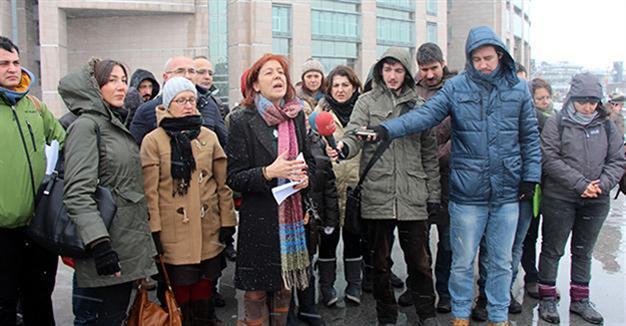Total of 464 probes opened into Turkish academics over ‘peace petition’
ISTANBUL

Academics, artists and NGO representatives speak to the press on Jan 19 in protest at investigations that had been launched into academics who signed a petition calling for an end to military operations in Turkey's southeast. DHA File Photo
A total of 464 investigations have been launched by public universities into academics who signed a petition calling for an end to military operations in Turkey’s southeast since the controversy erupted in January. In addition, nine of the signatory academics have been fired and five others have left their jobs amid an angry public campaign over the petition, according to a statement issued on March 10 by a group of leading academics.
“Regarding academics at public universities there have been 464 investigations, nine firings, five resignations, 27 suspensions, 153 criminal proceedings opened, and 33 detentions. At foundation universities there have been 21 firings, one forced retirement, and 43 administrative investigations [into terrorism-related allegations] since Jan. 11,” said a statement read out at a press conference in Istanbul on March 10 by Esra Mungan, from Boğaziçi University’s Psychology Department.
Mungan was accompanied at the meeting by Kıvanç Ersoy from Mimar Sinan Fine Arts University; Muzaffer Kaya, formerly of Nişantaşı University; and Meral Camcı, formerly of Yeni Yüzyıl University. All four were among the 1,128 academics who signed the petition calling for an end to clashes between security forces and outlawed Kurdistan Workers’ Party (PKK) militants.
The press statement said a “legal and verbal war” had been waged against signatory academics, even including death threats.
The 1,128 academics from 89 different universities - including foreign scholars like Noam Chomsky, David Harvey and Immanuel Wallerstein - signed the petition titled “We won’t be a part of this crime,” which called on Ankara to end the “massacre and slaughter” in southeastern Turkey in early January.
Universities and prosecutor’s offices across the country subsequently opened probes into a number of the 1,128 local and international academics and intellectuals who fall within the Turkish state’s jurisdiction, arguing that the petition went beyond the limits of academic freedoms.
